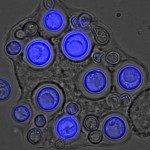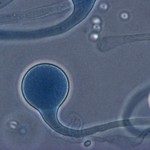Link to Pubmed [PMID] – 33298608
Link to DOI – e02331-2010.1128/JCM.02331-20
J Clin Microbiol 2021 Feb; 59(3):
Madurella mycetomatis is the major causative agent of eumycetoma, a neglected tropical infection characterized by painless subcutaneous lesions, inflammation, and grains draining from multiple sinuses. To study the epidemiology of mycetoma, a robust discriminatory typing technique is needed. We describe the use of a short-tandem-repeat assay (MmySTR) for genotyping of M. mycetomatis isolates predominantly from Sudan. Eleven microsatellite markers (3 dinucleotides, 4 trinucleotide repeats, and 4 tetranucleotide repeats) were selected from the M. mycetomatis MM55 genome using the Tandem Repeats Finder software. PCR amplification primers were designed for each microsatellite marker using primer3 software and amplified in a multicolor multiplex PCR approach. To establish the extent of genetic variation within the population, a collection of 120 clinical isolates from different regions was genotyped with this assay. The 11 selected MmySTR markers showed a large genotypic heterogeneity. From a collection of 120 isolates, 108 different genotypes were obtained. Simpson’s diversity index (D) value for individual markers ranged from 0.081 to 0.881, and the combined panel displayed an overall D value of 0.997. The MmySTR assay demonstrated high stability, reproducibility, and specificity. The MmySTR assay is a promising new typing technique that can be used to genotype isolates of M. mycetomatis Apart from the possible contribution of host factors, the genetic diversity observed among this group of isolates might contribute to the different clinical manifestations of mycetoma. We recommend that the MmySTR assay be used to establish a global reference database for future study of M. mycetomatis isolates.


